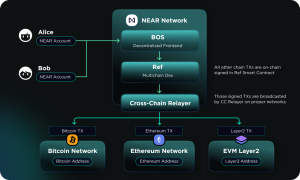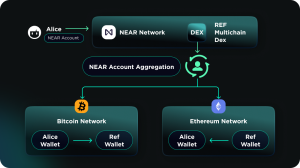In the ever-evolving landscape of decentralized exchanges (DEX), the recent surge in interest surrounding Chainflip has prompted a closer examination of the multichain DEX space. However, a game-changing player has stepped into the spotlight: NEAR Protocol, boasting a revolutionary Chain Abstraction technology that promises to redefine the multichain DEX experience. Let’s dive into a comparative analysis with existing multichain DEXs such as Chainflip and explore the promising potential of Ref 2.0’s multichain evolution.
A brief look into Chainflip
In Chainflip’s design, validators play a crucial role in supporting multichain functionality within the decentralized exchange. Their primary tasks involve maintaining the state chain’s consensus and interacting with distributed vaults off-chain across all supported networks. Additionally, validators serve as witnesses to synchronize state changes between these chains and the core state chain. This intricate orchestration, however, places validators in a trusted zone, a design aspect reflected in various protocol terms emphasizing their reliability. Notably, a challenge arises in dealing with chains lacking smart contract support, like the Bitcoin network, underscoring the complexities Chainflip addresses in achieving seamless multichain dynamics within the decentralized finance landscape.

NEAR’s Recent Pivot Towards Chain Abstraction
Enter NEAR’s Chain Abstraction, a beacon of trustlessness in the multichain DEX realm. Unlike traditional approaches, NEAR employs Account Aggregation, enabling secure and trustless signing of transactions on other chains from the NEAR chain. This groundbreaking approach empowers NEAR to abstract all chain interactions into on-chain MPC signatures, heralding a new era of trustless Chain Abstraction.

Nearcon Video reference on Chain Abstraction
https://www.youtube.com/watch?v=iyMLomqoNRY
By Kendall Cole @ Proximity
https://www.youtube.com/watch?v=rLTSBLbePLU
By David Millar-Durrant @ Pagoda
Implications of NEAR’s Chain Abstraction on DeFi:

NEAR’s Chain Abstraction isn’t just tech—it’s a DeFi game-changer. Users exclusively interact with the NEAR chain, accessing NEAR DeFi application streamlined frontend via BOS technology. Seamlessly participating in cross-chain DeFi activities, swapping, lending, in a more friendlier User Experience.
Here’s how it unfolds:
- Users leverage their NEAR accounts to engage with a DeFi application on NEAR, via BOS decentralized frontend, simplifying the entry point to cross-chain DeFi activities.
- A NEAR DeFi application, utilizing NEAR’s Chain Abstraction, prepares and signs transactions for any cross-chain involvement on behalf of users and the DEX itself.
- Cross-Chain Relayers, acting as NEAR smart contracts with customizable rules, take charge of handling these transactions, ensuring proper gas sponsorship based on specific business logic.
NEAR’s Chain Abstraction introduces a positive shift in the NEAR DeFi landscape. There’s potential for Ref.finance, Burrow.finance, and Orderly network to extend their Near DeFi services to various networks. This isn’t confined to one network; it’s about the smooth and secure movement of liquidity and assets across Ethereum, Ethereum layer2s, Bitcoin, Cosmos, and any chain supporting ECDSA signing. A new era of a connected and secure DeFi ecosystem on NEAR is unfolding.
Chain Abstraction on Ref 2.0, a multichain swap Dex

Dive into the potentials of Ref 2.0’s multichain capabilities facilitated by NEAR’s Chain Abstraction. Picture this: Alice aims to swap Ethereum for 1 Bitcoin from her Bitcoin wallet. The journey unfolds as follows:
- Alice initiates the swap on Ref 2.0’s smart contract using her NEAR root account, benefiting from Near Account Aggregation.
- Ref 2.0’s business logic calculates the amount of Ethereum Alice will receive.
- NEAR Account Aggregation works its magic, generating the necessary signatures for Bitcoin and Ethereum transactions.
- Bitcoin is transferred from Alice’s wallet to Ref’s Bitcoin wallet, while Ethereum is seamlessly moved from Ref’s Ethereum wallet to Alice’s account.
This process is devoid of smart contracts on the Bitcoin network and requires no asset bridging, truly exemplifying the power of NEAR’s trustless Chain Abstraction.
How does it compare with Chainflip
A table:
| Chainflip | Ref 2.0 | ||
| MPC threshold signature | Yes | Yes | |
| Assets bridged across chain | No | No | |
| Need deploy smart contract on 3rd party chain | Yes | No | |
| The way interact with 3rd party chain | Validators duty, lack programmable strategy | Dedicated cross-chain Relayers with programmable strategy on chain | |
| The way sync 3rd party chain state | Validators duty, lack flexibility | No limits, could cooperate with any existing chain oracle products | |
| The way user sign TX | Sign at 3rd party Chain | Always sign at Near Chain |
In summary, in the world of multichain DEX, things are changing with NEAR Protocol’s new Chain Abstraction tech. It’s all about making things more trustworthy and user-friendly. Ref 2.0 is on board with this change, putting itself at the front of the multichain DEX narrative. Users can now experience smoother interactions across different chains – it’s not just an idea but a real thing. It’s like a peek into the future, where Ref 2.0 offers a decentralized financial experience that’s easy and practical for everyone.
I’m a Crypto author and I take great interest in the Blockchain technology. I have been writing since 2014 on various aspects of the Bitcoin protocol and the Ethereum network. I’m also a regular contributor to Decrypt, where I cover news and offer analysis on the latest trends in the cryptocurrency industry.

